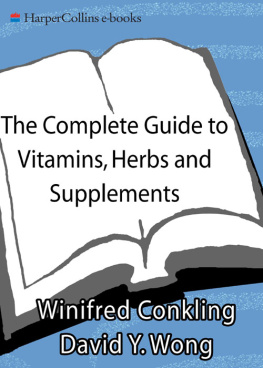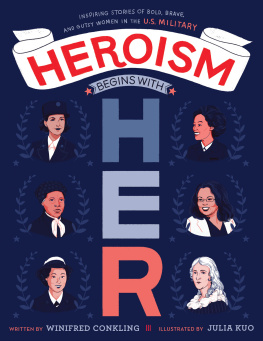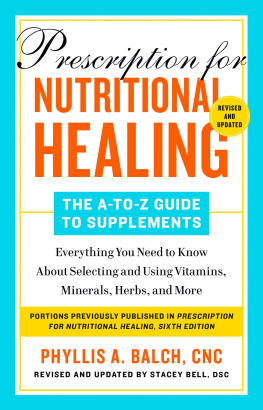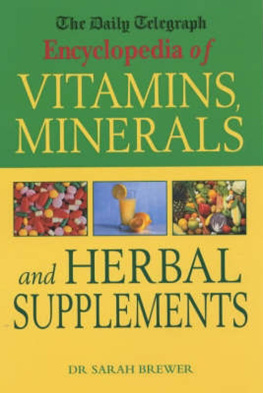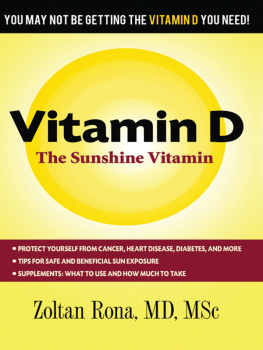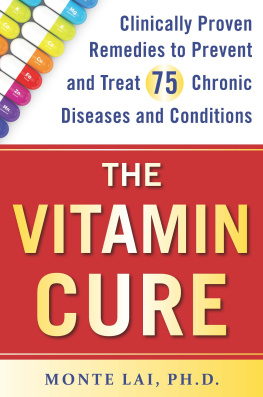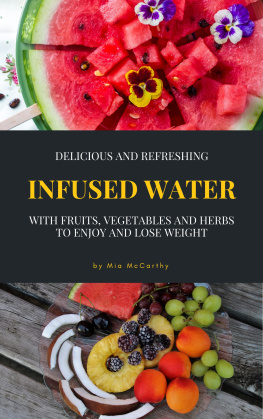THE
COMPLETE
GUIDE TO
VITAMINS
HERBS
AND
SUPPLEMENTS
THE HOLISTIC PATH TO GOOD HEALTH
WINIFRED CONKLING WITH DAVID Y. WONG, M.D., CONSULTING EDITOR
A LYNN SONBERG BOOK

For my father-in-law
Dan Rak
INTRODUCTION:
Mother Natures Miracles
If you eat a balanced diet and follow a healthy lifestyle, do you really need to take nutrition supplements? A few years ago, most doctors would have congratulated you on your clean living and told you to skip the supplements to save money. Today, however, most experts realize that almost everyoneincluding youcan benefit from taking some supplements.
Why the about-face? Simply put, my colleagues and I in the medical profession have a better understanding of nutrition and biochemistry than we did just a generation ago. Advances in our knowledge about nutrition and disease have underscored the essential role vitamins, minerals, herbs, and other substances play in good health. In addition, mounting evidence has shown that taking supplements may help prevent heart disease, cancer, osteoporosis, and other chronic diseases. I recommend supplements to virtually every patient I see at my Health Integration Centers in Torrance and Santa Monica, California.
Of course, supplements cant make up for an unhealthy diet and poor lifestyle choices. To enjoy optimal health, you need to eat plenty of fruits, vegetables, and whole grains, while avoiding excessive amounts of processed foods, sugar, and fat. But even once-skeptical doctors now agree, you would be well served to also include a multivitamin and selected nutrients in your daily routine.
THE IMPORTANCE OF SUPPLEMENTS
You already know that good nutrition is the foundation of good health. For the body to function properly, it must have a sufficient supply of more than forty key nutrients. While few Americans suffer from severe deficiency diseases such as scurvy or rickets, the Council for Responsible Nutrition reports that most Americans do not consume adequate amounts of many nutrients, including vitamins A, B6, B12, C, E, thiamin, riboflavin, and folic acid, and the minerals calcium, chromium, iron, magnesium, selenium, and zinc. These inadequate intakes may not trigger a disease directly caused by a nutrient deficiency, but they leave the body vulnerable to other diseases and chronic conditions, such as heart disease and cancer, among many others.
This link between nutrition and health has been an area of extensive study in the past decade. Scientific investigations into the medicinal value of vitamins, minerals, herbs, phytochemicals (chemicals in plants), enzymes, hormones, and other natural supplements have led researchers and physicians to appreciate the health-enhancing properties of these compounds.
In other words, food is not only fuel for the body, but medicine as well. Unfortunately, the typical American diet is deficient in nutrients and fiber and high in fat, cholesterol, and preservatives. Alas, even if you include lots of fresh fruits, vegetables, and whole grains in your diet, you may not be consuming as many nutrients as you think you are. Most nonorganic foods grow in nutritionally deficient soil, which generates nutritionally deficient produce. Furthermore, between the time the food leaves the field and reaches your dinner plate, additional nutrients are destroyed by food processing, storing, and cooking.
To make matters worse, your body may not be able to take advantage of all the nutrients you do consume. Emotional and physical stress can cause a breakdown of your immune system and make you susceptible to invasion by harmful microorganisms, resulting in countless problems, from the common cold to ulcers to heart disease, all of which can hinder how your body absorbs and uses nutrients. Stress also increases your bodys requirements for many nutrients, especially the water-soluble vitamins such as vitamin C and the B vitamins. Thats why, for example, you can buy vitamin combinations sold as stress formulas, which contain the B vitamins and often vitamin C as well.
In addition, the process of aging increases the bodys demands for nutrients. As you age, your body loses some of its ability to assimilate the nutrients you consume. For example, as you grow older, you may experience declining levels of many important nutrients, including amino acids (such as methionine and cysteine), antioxidants (such as coenzyme Q10 and vitamin E), and DHEA (a precursor for many hormones). Ironically, your bodys demand for these nutrients increases at the same time your physical reserves drop. Supplementation is one solution. While it cannot stop aging, it can help make the inevitable process easier and healthier.
ALTERNATIVE MEDICINE COMES OF AGE
Alternative or natural medicine is based on one simple truth: The human body has considerable power to heal itself. Wounds heal, rashes disappear, and illnesses run their course. As a healer, I strive to support the natural healing process of the body. It is essential to view yourself as a wholebody, mind, and spiritrather than focusing on the part that is sick or injured.
Practitioners of conventional medicine too often focus on controlling symptoms of disease or injury, using drugs and surgery to deal with specific complaints or conditions.
In recent years, natural medicine has come into its own. For more than a decade, the sales of supplements, including vitamins and herbs, have risen steadily and dramatically. According to the Nutrition Business Journal, Americans spent more than $20 billion on supplements in 2003. Clearly, the American public has learned to appreciate the health benefits associated with nutrition supplements.
In addition, alternative healing is finally receiving the respect it deserves from practitioners of mainstream medicine. Many medical organizations that in the past had spoken out against natural medicine now endorse many of the same recommendations that practitioners of natural medicine have been making for decades. For the last half-century, naturopaths have recommended that people eat high-fiber foods, exercise on a regular basis, reduce stress, and cut back on the intake of refined sugars, fats, and processed foods, but it is only in the last decade or so that many conventional practitioners support these same suggestions.
Likewise, nutritional and herbal medicine and other natural methods of healing are being taught in mainstream hospital centers and medical schools, places where the techniques were dismissed not long ago. Even the renowned National Institutes of Health opened the National Center for Complementary and Alternative Medicine in 1998, and began funding research on various alternative medicine techniques.
Natural medicine is taking its place next to traditional medicine, especially in the treatment of relatively minor conditions. If you develop a serious illness or suffer a major injury, by all means head for the doctor, but to stave off a cold or deal with a chronic health problem, you might want to try an alternative treatment. No single system of medicine provides all the answers all the time. A cooperative approach to medical care, which includes both traditional treatments and natural remedies, may provide the best care for your overall health.
The Complete Book of Vitamins, Herbs, and Supplements for Health and Healing provides simple and straightforward advice on how to design a supplement program for general health, as well as how to choose supplements to address specific common medical problems. I believe vitamins, minerals, herbs, and other nutrition supplements play an essential role in establishing good health. This book will demystify the world of nutritional supplements so that you can use them to enhance your overall health.

